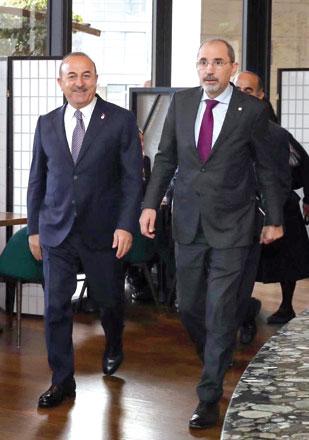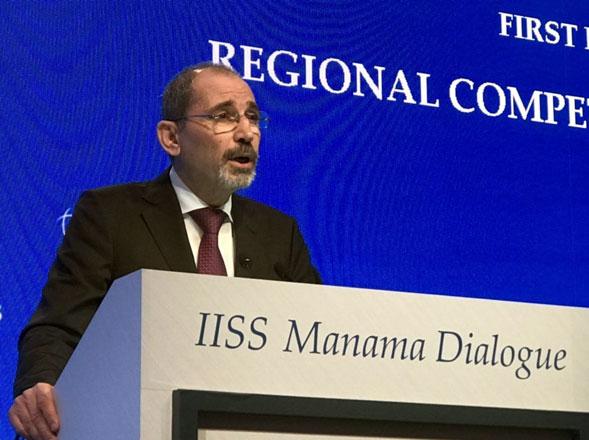You are here
FM calls for active Arab role in resolving regional crises
By JT - Dec 05,2020 - Last updated at Dec 05,2020

Deputy Prime Minister and Minister of Foreign Affairs Ayman Safadi delivers his address at the IISS Manama Dialogue on Saturday (Petra photo)
AMMAN — Deputy Prime Minister and Minister of Foreign Affairs Ayman Safadi on Saturday participated in the IISS Manama Dialogue, the Jordan News Agency, Petra, reported.
During the conference, the foreign minister stressed the necessity of adopting an active Arab role for resolving regional conflicts, considering “the absence of collective Arab efforts an abnormal occurrence that should be changed”.
Reiterating the importance of collaborating with international partners, Safadi focussed on a number of regional conflicts topped by the Palestinian cause.
Safadi placed emphasis on the centrality of the Palestinian cause, viewing the two-state solution, a strategic Arab decision, the way to achieve a fair and comprehensive peace, security, and stability on the regional and international levels.
There is no alternative to the two-state solution that is materialised by the establishment of the independent, sovereign and viable Palestinian state, living in peace with Israel, on the June 4, 1967, lines with East Jerusalem as its capital, in accordance with international law and the Arab Peace Initiative, Safadi added.
The foreign minister also called for “serious and effective” negotiations in accordance with international legitimacy resolutions, warning against Israel’s illegitimate activities such as building settlements, demolishing homes and confiscating Palestinian lands, which hinder the two-state solution.
“No cause is as sensitive as that of Jerusalem and its holy sites,” Safadi said, rendering any attack targeting the city a provocation to millions of Muslims and Christians around the world, which would lead to conflict escalation.
In regard to the Syrian crisis, the foreign minister noted that “there is currently no clear strategy to resolve the crisis”, yet Arabs must develop one to reach a political solution that would preserve the stability, security and unity of Syria.
Concerning Iraq, Safadi emphasised the importance of protecting the country from the repercussions of regional conflicts, adding that the Iraqi government, which scored a victory against terrorism, must be supported in its journey of rebuilding, securing stability, regaining sovereignty, and safeguarding itself against foreign agendas.
The danger of terrorism is still looming, Safadi stressed, adding that it must be countered through a comprehensive methodology as highlighted in the Aqaba meetings launched by His Majesty King Abdullah years ago.
Terrorism is a common enemy that bears no affiliation with Islam and the values of peace, tolerance, and mutual love and respect for the other, the foreign minister said, apprising of falling for terrorist’s trap of portraying the war on terrorism as that between the Islamic world and the West. Terrorists are enemies of all of those who disagree with its “darkness”.
In regard to Iran, Safadi said that Arab countries seek relations with the country on the principle of good neighbourliness and refraining from meddling in domestic affairs, calling for the consideration of Arab interests when exerting any effort to redefine the Arab-Iranian relations.
The minister called for the establishment of regional organisations to bolster cooperation related to food security, health and education, Petra reported.
On the sidelines of the Manama meeting, the foreign minister met with his Saudi counterpart Prince Faisal Bin Farhan, Iraqi Foreign Minister Fuad Hussein and South Korean counterpart Kang Kyung-wha, with whom he discussed bolstering cooperation in a multitude of sectors.
Also talking over strengthening collaboration, he met with President of the International Committee of the Red Cross Peter Mawer, Secretary General of the Cooperation Council for the Arab States of the Gulf Nayef Hajraf, and State Secretary of the Federal Foreign Office of Germany Miguel Berger.
Related Articles
AMMAN — Foreign Minister Ayman Safadi on Thursday held a series of meetings with top officials attending the London initiative, with talks f
AMMAN — Foreign Minister Ayman Safadi on Saturday said that regional peace and security can only be achieved with the ending of the Israeli
AMMAN — Deputy Prime Minister and Foreign Minister Ayman Safadi on Sunday met with Bahraini Foreign Minister Abdul Latif Al Zayani to discus


















